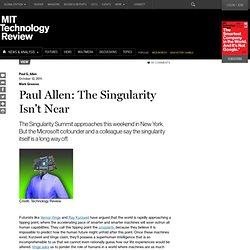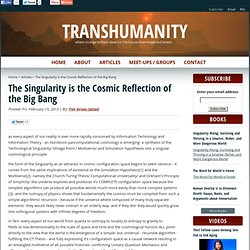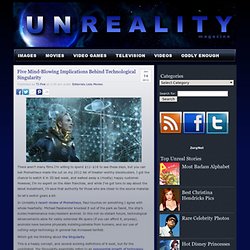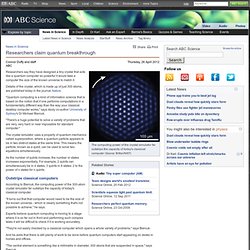

Technological utopianism. In the late 20th and early 21st centuries, several ideologies and movements, such as the cyberdelic counterculture, the Californian Ideology, transhumanism,[1] and singularitarianism, have emerged promoting a form of techno-utopia as a reachable goal.

Cultural critic Imre Szeman argues technological utopianism is an irrational social narrative because there is no evidence to support it. He concludes that what it shows is the extent to which modern societies place a lot of faith in narratives of progress and technology overcoming things, despite all evidence to the contrary.[2] History[edit] Technological utopianism from the 19th to mid-20th centuries[edit] The AI Singularity is Dead; Long Live the Cybernetic Singularity : Science Not Fiction. The nerd echo chamber is reverberating this week with the furious debate over Charlie Stross’ doubts about the possibility of an artificial “human-level intelligence” explosion – also known as the Singularity.

As currently defined, the Singularity will be an event in the future in which artificial intelligence reaches human level intelligence. At that point, the AI (i.e. AI n) will reflexively begin to improve itself and build AI’s more intelligent than itself (i.e. Three arguments against the singularity. I periodically get email from folks who, having read "Accelerando", assume I am some kind of fire-breathing extropian zealot who believes in the imminence of the singularity, the uploading of the libertarians, and the rapture of the nerds.

I find this mildly distressing, and so I think it's time to set the record straight and say what I really think. Short version: Santa Claus doesn't exist. Long version: I'm going to take it as read that you've read Vernor Vinge's essay on the coming technological singularity (1993), are familiar with Hans Moravec's concept of mind uploading, and know about Nick Bostrom's Simulation argument. If not, stop right now and read them before you continue with this piece. (In passing, let me add that I am not an extropian, although I've hung out on and participated in their online discussions since the early 1990s.
But anyway ... Paul Allen: The Singularity Isn't Near. Futurists like Vernor Vinge and Ray Kurzweil have argued that the world is rapidly approaching a tipping point, where the accelerating pace of smarter and smarter machines will soon outrun all human capabilities.

They call this tipping point the singularity, because they believe it is impossible to predict how the human future might unfold after this point. Once these machines exist, Kurzweil and Vinge claim, they’ll possess a superhuman intelligence that is so incomprehensible to us that we cannot even rationally guess how our life experiences would be altered. Vinge asks us to ponder the role of humans in a world where machines are as much smarter than us as we are smarter than our pet dogs and cats.
Kurzweil, who is a bit more optimistic, envisions a future in which developments in medical nanotechnology will allow us to download a copy of our individual brains into these superhuman machines, leave our bodies behind, and, in a sense, live forever. The Singularity is not coming - Cognitive Social Web - A better web, for a better world. Covering technological, scientific, and cultural trends that are changing–and will change–human beings in fundamental ways.
Singularitarianism. Singularitarianism is a technocentric ideology and social movement defined by the belief that a technological singularity—the creation of superintelligence—will likely happen in the medium future, and that deliberate action ought to be taken to ensure that the Singularity benefits humans.

Singularitarians are distinguished from other futurists who speculate on a technological singularity by their belief that the Singularity is not only possible, but desirable if guided prudently. Accordingly, they might sometimes dedicate their lives to acting in ways they believe will contribute to its rapid yet safe realization.[1] Some critics argue that Singularitarianism is a new religious movement promising salvation in a technological utopia.[3] Others are concerned that the interest in the Singularity by corporate and military interests provides a clue as to the real direction and social implication of emerging technologies celebrated by Singularitarians.[4] Etymology[edit] History[edit] Category:Singularitarianism. This category concerns Singularitarians and their efforts to bring about a humane technological singularity, the theoretical future point which takes place during a period of accelerating change sometime after the creation of a superintelligence.

The following 30 pages are in this category, out of 30 total. This list may not reflect recent changes (learn more). Transhumanity.net.
Out of the Blue. The Singularity is the Cosmic Reflection of the Big Bang. Posted: Fri, February 15, 2013 | By: Tim Gross (Setai) as every aspect of our reality is ever more rapidly consumed by Information Technology and Information Theory - an Ouroboric pancomputational cosmology is emerging- a synthesis of the Technological Singularity/ Omega Point / Multiverse/ and Simulation hypotheses into a singular cosmological principle- in fact- every aspect of our world from quanta to isotropy to locality to entropy to gravity to fields to low dimensionality to the scale of space and time and the cosmological horizon ALL point directly to the view that the world is the emergence of a simple- but universal - recursive algorithm- fulfilling the CT Thesis - and fully expressing it’s configuration space as a causal network resultng in an entangled multiverse of all possible histories- confirming Unitary Quantum Mechanics and affirming all the arguments of people like Tegmark and David Deutsch [4]-

SINGULARITY 2045 - Technological Utopia. Singularity is Near Research Links. Kurzweil Responds: Don't Underestimate the Singularity. Although Paul Allen paraphrases my 2005 book, The Singularity Is Near, in the title of his essay (cowritten with his colleague Mark Greaves), it appears that he has not actually read the book.

His only citation is to an essay I wrote in 2001 (“The Law of Accelerating Returns”) and his article does not acknowledge or respond to arguments I actually make in the book. When my 1999 book, The Age of Spiritual Machines, was published, and augmented a couple of years later by the 2001 essay, it generated several lines of criticism, such as Moore’s law will come to an end, hardware capability may be expanding exponentially but software is stuck in the mud, the brain is too complicated, there are capabilities in the brain that inherently cannot be replicated in software, and several others. Inventor, Author, Futurist. Five Mind-Blowing Implications Behind Technological Singularity. There aren’t many films I’m willing to spend $12–$16 to see these days, but you can bet Prometheus made the cut on my 2012 list of theater-worthy blockbusters.

I got the chance to watch it in 3D last week, and walked away a (mostly) happy customer. However, I’m no expert on the Alien franchise, and while I’ve got tons to say about the latest installment, I’ll save that authority for those who are closer to the source material. So let’s switch gears a bit. In Unreality’s recent review of Prometheus, Paul touches on something I agree with whole-heartedly: Michael Fassbender knocked it out of the park as David, the ship’s butler/maintenance man/resident android. In this not-so-distant future, technological advancements allow for vastly extended life spans (if you can afford it, anyway), androids have become physically indistinguishable from humans, and our use of cutting-edge technology in general has increased tenfold. Which got me thinking about the Singularity.
7 Totally Unexpected Outcomes That Could Follow the Singularity. Researchers claim quantum breakthrough › News in Science (ABC Science) News in Science Thursday, 26 April 2012 Connor Duffy and staffABC Giant leap Researchers say they have designed a tiny crystal that acts like a quantum computer so powerful it would take a computer the size of the known universe to match it.

Details of the crystal, which is made up of just 300 atoms, are published today in the journal Nature. "Quantum computing is a kind of information science that is based on the notion that if one performs computations in a fundamentally different way than the way your classical desktop computer works," says study co-author University of Sydney's Dr Michael Biercuk. "There's a huge potential to solve a variety of problems that are very, very hard or near impossible for standard computer. " The Law of Accelerating Returns.
An analysis of the history of technology shows that technological change is exponential, contrary to the common-sense “intuitive linear” view. So we won’t experience 100 years of progress in the 21st century — it will be more like 20,000 years of progress (at today’s rate). The “returns,” such as chip speed and cost-effectiveness, also increase exponentially. There’s even exponential growth in the rate of exponential growth. Gero Miesenboeck reengineers a brain. Artificial Intelligence. Bioengineers introduce 'Bi-Fi' If you were a bacterium, the virus M13 might seem innocuous enough. It insinuates more than it invades, setting up shop like a freeloading houseguest, not a killer.
Once inside it makes itself at home, eating your food, texting indiscriminately. Recently, however, bioengineers at Stanford University have given M13 a bit of a makeover. The researchers, Monica Ortiz, a doctoral candidate in bioengineering, and Drew Endy, PhD, an assistant professor of bioengineering, have parasitized the parasite and harnessed M13's key attributes -- its non-lethality and its ability to package and broadcast arbitrary DNA strands -- to create what might be termed the biological Internet, or "Bi-Fi.
" Their findings were published online Sept. 7 in the Journal of Biological Engineering. Using the virus, Ortiz and Endy have created a biological mechanism to send genetic messages from cell to cell. Medium and message M13 is a packager of genetic messages. Synthetic Biology: Building a Language to Program Cells - IEEE Life Sciences. By Dr. Christopher Voigt Living cells are the ultimate programming substrate. Whats the likelihood of the singularity.